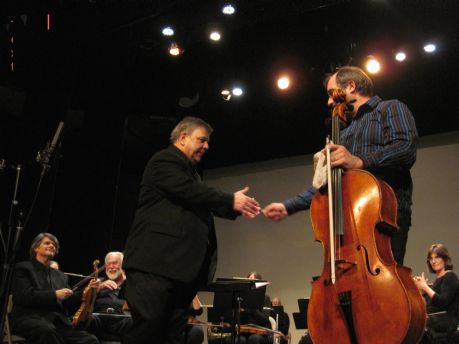|
Symphony
FROM THE NEW WORLD TO THE OLD WORLD
by Peter Lert
Saturday, June 14, 2025
Chamber
MC2 DUO RECITAL CLOSES 222'S SEASON
by Terry McNeill
Saturday, June 14, 2025
Choral and Vocal
CANTIAMO SONOMA'S LUSCIOUS A CAPELLA SINGING IN SEASON ENDING CONCERT
by Pamela Hicks Gailey
Sunday, June 8, 2025
Symphony
SRS SEASON ENDS WITH RESOUNDING TA-TA-TA-BANG
by Terry McNeill
Sunday, June 1, 2025
Symphony
YOUTHFUL VIRTUOSITY ON DISPLAY AT USO'S MAY CONCERTS
by Peter Lert
Saturday, May 17, 2025
Symphony
MYSTICAL PLANETS AND LIVELY GERSHWIN ORTIZ AT FINAL SRS CONCERT
by Peter Lert
Sunday, May 4, 2025
Symphony
VSO'S CONCERT MUSIC OF TIME, MUSIC OF PLACE
by Peter Lert
Sunday, April 27, 2025
VOCAL ELEGANCE AND FIRE AT THE 222'S RECITAL APRIL 26
by Pamela Hicks Gailey
Saturday, April 26, 2025
CANTIAMO SONOMA SINGS AN INSPIRED GOOD FRIDAY MOZART REQUIEM CONCERT
by Pamela Hicks Gailey
Friday, April 18, 2025
DRAMATIC SHOSTAKOVICH SYMPHONY CLOSES PHILHARMONIC'S 25TH SEASON
by Terry McNeill
Sunday, April 13, 2025
|
 |
 P. Santos and J. Koningsmark (left) watch as Les Pfutzenreuter greets Joel Cohen |
HEALDSBURG PHILHARMONIA PLAYS THE RAVEN
by Terry McNeill
Sunday, February 22, 2015
Les Pfutzenreuter is a conductor that gets around, moving from his Ukiah base at Mendocino College and the Ukiah Symphony to festival and concert appearances with many orchestras. February 22 found him with the Healdsburg Philharmonia in that City’s Raven Theater with works of Copland and Tchaikovsky.
Cellist Joel Cohen was the featured soloist in Tchaikovskyís Rococo Variations, Op. 33, a work he played recently with the same conductor and the Ukiah Symphony. Here the Orchestra was reduced in size, not a bad thing considering the intimate nature of the Russianís composerís work from 1877, but I found myself missing the heft of more strings in the original score. Mr. Cohen gave a compelling if not especially virtuosic reading of the 20-minute work, and was the only person on stage eschewing standard black concert attire.
The soloist was especially persuasive in the instrumentís lower register, but the low fingerboard positions bought intonation problems as they sporadically did with the violins. Mr. Cohen chose a relatively subdued approach to projection and vibrato, certainly a valid stance in a work that is classical and elegant rather than heaven storming. His control of pianissimo was sure and the two beguiling descending slides were decorous. Though several of the variations needed more velocity Mr. Cohen was never in a hurry, phrasing with care and blending well with Mr. Pfutzenreuterís direction.
Surprisingly he played an encore, a set of spiffy variations by Novato composer Mark Summer on the melody ďLo How A Rose E'er Blooming,Ē with sections that sounded like a Bach Gigue and then some sans-bow strumming and hand slapping on the cello body. The audience of 175 loved it and extended the applause for the soloist and musicians.
In the first half Coplandís Appalachian Spring Suite and an arrangement for small orchestra of the Tender Land Suite were heard. Both were for 13 Instruments and the latter featured soprano Abigail Rowland and tenor Alexander Taite. There was polished playing from concertmaster Phillip Santos, flutist Michalle Caimotto, bassoonists Beverly McChesney and Ann Hubbard, and (performing a kind of continuo and pedal point) pianist Elizabeth MacDougall. Unlike in many orchestral compositions the piano in Copland (and Shostakovich) can actually be heard through the orchestra fabric.
The familiar themes from the famous Martha Graham 1944 ballet were deftly shaped by Mr. Pfutzenreuter and the commonly played version for full orchestra that is more dense and expansive wasnít missed.
In the 31-minute Tender Land work the two singers were amplified, a strange choice for the conductor as it upset the balance between voice and instruments. Itís rare that two non-Wagnerian singers can cover even a small orchestra, but amplification can do it! The symphonic textures here were parallel to the Appalachian Spring Suite. Ms. Rowlandís voice seemed more suited to Coplandís style than Mr. Taite, as in the duet after the playful party section the tenor tended to have a raw top at phrase endings. Coplandís vocal line often borders on Sprechstimme (speech singing) and excludes much warm lyricism.
Throughout the afternoon the ensemble and graceful playing from the winds gave color and impetus to the three works, a validation of the conductorís programing and authority.
Impresario Robert Hayden contributed to this review.
|

